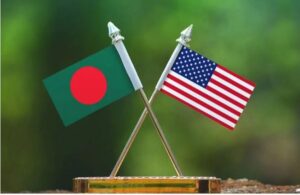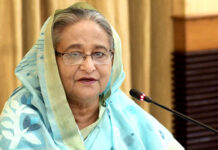 Commerce ministry senior secretary Tapan Kanti Ghosh said on Monday that the government would appraise the United States about the improvement of the labour rights situation and the recent initiatives taken by the country to ensure labour rights.
Commerce ministry senior secretary Tapan Kanti Ghosh said on Monday that the government would appraise the United States about the improvement of the labour rights situation and the recent initiatives taken by the country to ensure labour rights.
Following an exclusive meeting on the implementation of the National Action Plan on the labour sector held at the commerce ministry in the capital, the secretary told reporters that Bangladesh had taken several initiatives, including the amendment of the labour act and EPZ act to ensure workers’ rights in line with the recommendations from the US, the European Union, and the International Labour Organisation.
Describing the recent initiatives on labour reforms, Tapan Kanti said that the labour rights situation in Bangladesh was not at a level that warranted US trade restrictions.
Labour secretary Md Ehsan-E-Elahi, the Federation of Bangladesh Chambers of Commerce and Industry president Md Mahbubul Alam, Bangladesh Garment Manufacturers and Exporters Association president Faruque Hassan, Bangladesh Knitwear Manufacturers and Exporters Association executive president Mohammad Hatem, and representatives of the Bangladesh Export Processing Zones Authority were among those attending the meeting.
The meeting was convened to discuss the recently announced Presidential Memorandum on Advancing Worker Empowerment, Rights, and High Labour Standards Globally issued by United States president Joe Biden and the concerns expressed by the EU over the human and labour rights situation in Bangladesh.
According to meeting sources, the participants of the meeting also discussed a letter sent by the Bangladesh embassy in Washington alerting the commerce ministry that Bangladesh might be one of the targets of the US memorandum.
On November 16, the US, in its memorandum, said that the country would work to hold accountable those who threaten, intimidate, and attack union leaders, labour rights defenders, and labour organisations by using tools like sanctions, trade penalties, and visa restrictions.
The commerce secretary said that the US presidential memorandum on labour was not only for Bangladesh but rather a US policy that would apply to all countries in the world.
He said that Bangladesh was improving the labour situation gradually and that the country was heading towards the implementation of the National Action Plan by 2026.
‘We discussed the labour situation with the US authorities during the last meeting of the Trade and Investment Cooperation Forum Agreement in September and also with the EU delegation in November. They expressed their satisfaction in many areas and suggested we improve the situation in some other areas. We are working to improve more, and it is a continuous process,’ Tapan Kanti said
He said that Bangladesh had improved in many areas, like reducing the minimum member threshold for forming trade unions to 15 per cent from 20 per cent and introducing inspections by the Department of Inspection for Factories and Establishments in the industrial units located in Export Processing Zones.
The commerce secretary said that the US, the EU, and the ILO recommended ensuring trade union rights for EPZ workers, and the government would take a decision in this regard through discussion with stakeholders.
He, however, said that despite having no duty benefit, the US became the single largest export destination for Bangladeshi apparel due to its competitive prices.
‘Though Bangladeshi apparel items face the highest duty in the US, our exports to the market are increasing gradually. It means we do not do business on the market at anyone’s mercy. The US imports from Bangladesh as we can export quality apparel at competitive prices complying with all global standards,’ Tapan Kanti said.
BGMEA president Faruque Hassan said that they had discussed the implementation progress of NAP and the smooth transition of the country from a least developed country to a developing one in 2026.
‘We have discussed that all the issues, including labour rights, will be resolved through dialogue and enhanced engagement with global partners, including the US, the EU, and the ILO,’ he said.
New Age









